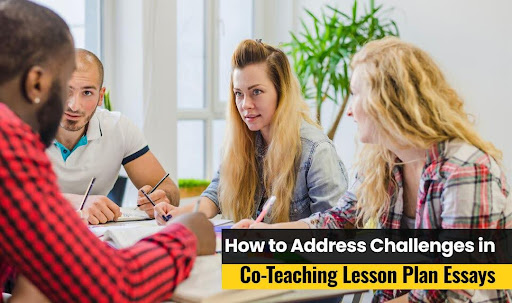How To Address Challenges In Co-Teaching Lesson Plan Essays
In this guide, you will learn co-teaching methods and some useful tips to deal with challenges that you can face while writing an essay on a Co-teaching lesson plan.
Author:K. N.Sep 30, 202413.6K Shares227.4K Views

Co-teaching lesson plan essays are very useful in inclusive classrooms where various students with different needs study together. These writings emphasise the importance of the collective responsibility of instructors and how they enhance the learning process. It is also important to develop lesson plans that address the challenges that come with co-teaching.
Lesson plan essays include ideal strategies that enhance collaboration and academic performance of students in the classroom. In this guide, you will learn co-teaching methods and some useful tips to deal with challenges that you can face while writing an essay on a Co-teaching lesson plan. But, before delving into challenges, let’s first get to know what this essay is.
What Is A Co-Teaching Lesson Plan Essay?
A co-teaching lesson plan essay is the collaborative process of creating and executing a lesson plan within the classroom, involving the involvement of multiple teachers. Co-teaching involves general educators sharing the responsibility of lesson planning, execution, and assessment.
The primary objective of the lesson plan essay on the co-teaching process is to cater to the unique learning requirements of each student, including those with special needs or those who learn differently.
8 Tips To Address Challenges In Co-Teaching Lesson Plan Essays
A collaborative learning style, i.e., co-teaching, in which two or more two educators work together to prepare, deliver, and evaluate lessons. Collaboration among teachers can be challenging, resulting in difficulties in designing lessons that cater to the diverse needs of their students. If you are writing an essay on a co-teaching lesson plan, you can acquire services from online essay-writing firms. These professionals create structured curricula that incorporate classroom strategies and effective student engagement.
Besides, below are eight useful tips that you can follow to avoid challenges in co-teaching lesson plan essays.
Clearly Define Roles And Responsibilities
Ensuring that every teacher is aware of their roles and responsibilities in co-teaching lesson plans is one of the biggest problems. These roles should be clearly defined in the curriculum planning process to avoid misunderstanding and duplication of work.
Neither of these approaches requires teachers to step on the other’s toes while performing effectively. By assigning activities based on students' strengths, learning becomes more efficient. So, students with disabilities can benefit from unique skills in the classroom.
Furthermore, keeping the lines of communication open about activities assures flexibility in planning as circumstances demand. This may result in a seamless collaborative learning experience.
Recommendations Of Clear Descriptions Of Tasks And Activities
- Discuss duties and responsibilities with a co-teacher at the beginning of the curriculum process.
- Keep in touch with co-teachers during the course.
- Assign duties and responsibilities in a manner that best utilises each teacher’s qualifications and skills.
- Clearly define each teacher’s role in the curriculum to ensure everyone is on the same page.
- Be prepared to modify roles and tasks as needed to ensure learning success.
Communicate Regularly And Effectively
Co-teaching communication strategies are central to success in the educational setting. They include the timeliness of feedback given after a class and the determination of the major and minor teaching objectives of a lesson. If concepts and techniques agreed upon are not observed and repeated, negotiations are not held. So, misleading ideas and variations may cause chaos within learners and the overall environment.
Also having joint planning and teaching helps to resolve communication problems and more easily distribute relevant information among teachers. Furthermore, frequent discussions about students’ goals and their progress help them to make the necessary changes in co-teaching lesson plan essays.
Importance Of Feedback
Feedback must be shared after every class to gain insight into what strategies worked and what factors need adjustments. In addition, the continuous exchange of information facilitates beneficial changes. These include general education teacher-learner interactions, promoting mutual benefit without disrupting teaching dynamics. Co-teaching partners who communicate efficiently, steadily, and fairly openly make activities, planning, and coordination of sensitive innovative content easier.
Adapt Instruction For Different Learning Styles
Clear and effective communication is vital in easing the challenges faced while crafting co-teaching lesson plan essays. This ensures that the goals of lessons, teaching methods, and class behaviour are well coordinated between the two teachers.
Moreover, regular sessions facilitate collaborative writing of lesson plans, ensuring all teachers are aware of their responsibilities. Communication methods like emails, shared documents, and face-to-face meetings are essential for planning urgent communication during a limited time.
However, time constraints can make it difficult for many teachers to organise these collaborative sessions, which can hinder the process. To overcome this challenge, buying essays onlineon co-teaching lesson plans is the best choice. This approach is not only time-saving but also provides a structured curriculum, which can be modified according to the specific needs of the classroom.
The Significance Of Communication In Co-Teaching
When special educators work together well, they can:
- Define the roles and responsibilities to ensure none of them is confused or waste efforts duplicating work done by others.
- Utilising will enable them to come up with a comprehensive lesson plan as a team.
- Plan as a group and encounter and solve any issues or problems.
- Help to improve the course design and its implementation through fair and effective feedback.
Plan Time Efficiently
The primary challenge lies in inefficient time management, particularly when scheduling two instructors. Time management planning becomes critical to address in co-teaching lesson plan essays. So, the team should schedule regular intervals for the co-teaching plan, ensuring both teachers can share the workload without excessive stress. The process is easier to complete over multiple periods, as it allows for better concentration on the task at hand.
Furthermore, both teachers may stick to the focus of their work and complete tasks by their deadlines so that no task would be done at the last minute. Therefore, due to appropriate time planning and collaboration, co-teachers are more likely to be uninterrupted.
Utilise Classroom Space Effectively
Within the co-teaching lesson plan essays, one such strategy to overcome coordination challenges is to consider the effective utilisation of the classroom. The physical environment in a co-teaching classroom should be designed to accommodate the unique teaching styles of both teachers. Additionally, this may promote their freedom of movement and interaction with students.
Classroom visibility is also important as this ensures that all students are easily seen by teachers. Furthermore, thoughtful planning of the learning environment by co-teachers enables them to create a more orderly, inclusive, and productive learning environment. So, this may enhance their ability to support teaching partnerships and advance the learning of their students.
Leverage Different Teaching Strengths
To effectively co-teach, it is crucial to establish teachers' competencies in subject content, student interaction, and discipline management. These criteria improve teacher-student communication by distributing work based on teachers' strengths, allowing for better lesson presentations and broader exposure to students.
Strategies For Utilising Different Dominant Teaching Orientations
- Identify the strong points and weaknesses of the teachers involved.
- Split responsibilities and tasks in pairs.
- Build a shared goal.
- Communicate all the time.
- Be flexible
Co-Teaching Models For Effective Teaching
Co-teaching models involve planning and implementing instruction in collaboration with others, varying degrees of co-teacher differentiation, and joint effort. There exist a few off-repeated co-teaching suggestions which include one teach, one assist, group teaching, parallel teaching, alternative teaching and team teaching. Effective co-teaching models help meet students' diverse needs, maximising instructional time, resources, and experience.
Reflect On Conflict Resolution
The team-teaching environments often face conflicts due to differences in expectations, classroom management styles, or teaching philosophies. To handle such issues and ensure a healthy collaborative workplace, reflective practice regarding the resolution of disagreements in co-teaching lesson plan essays must be carried out.
Moreover, conflict resolution techniques, such as demonstrating interdependence, active listening, and mutual respect, resolve disagreements constructively and ensure that academic partnerships remain strong. So, consistent communication and reflection lead to more productive collaborative learning by preventing minor problems from getting out of hand.
Comprehending The Source Of Conflict
There are many conditions under which planning and co-teaching conflicts arise, such as:
- Differing beliefs and practices in teaching.
- Not using the same instructional tools or instructional techniques with students.
- Confusion and communication breakdowns between co-teachers.
- Clashing personalities and differences in work styles.
Evaluate And Adjust The Plan
To overcome the challenges and ensure growth, it is paramount to look back at the co-teaching lesson plan essays and make appropriate adjustments. Teachers should regularly assess existing strategies and consider teachers' and students' input. This may help them identify usefulness and areas for improvement.
Constant feedback fosters good working relationships between co-teachers. Further to this, it offers a more motivating, flexible instructional strategy for students. In addition, this type of reflection allows for evaluation to uncover gaps in the lesson plan.
Systematic reviews are also planned to assess the tactical nature of the co-teaching strategy and its readiness for further improvement. However, due to a lack of experience in conducting such research, some teachers may find it difficult to implement systematic reviews.
This makes it difficult to write co-teaching lesson plan essays effectively. Here, hiring expert essay helpers in the UKcan be beneficial. These professionals can offer advice on how to structure a systematic review in your writing so that all necessary elements are included for maximum efficiency.
Conclusion
Developing co-teaching lesson plan essays poses numerous hurdles that need to be dealt with through strategic actions, flexibility, and strong communication skills. By focusing on the major matters, co-teaching teams can construct a more relaxing and constructive environment.
It is necessary to support the processes of co-teaching with the challenges addressed above. Since all members work together in addressing problems. So, a dynamic partnership should be created that not only enhances teaching practices and learning processes but also promotes teacher and learner growth.
Thus, co-teaching, when combined with other strategies and cooperative measures, can be a cost-effective and efficient method for delivering quality education.

K. N.
Author
Latest Articles
Popular Articles
